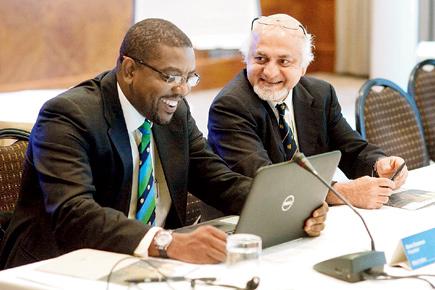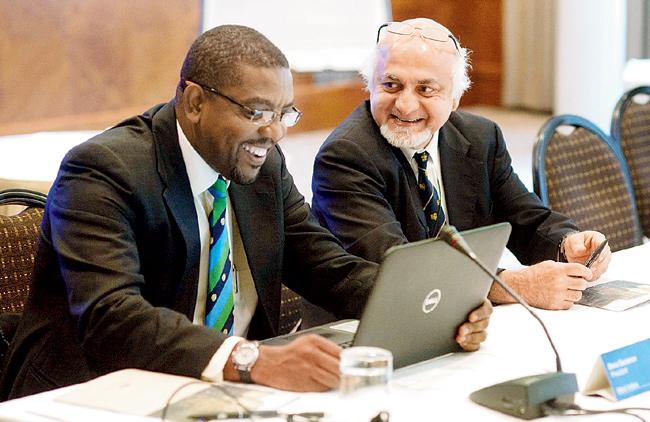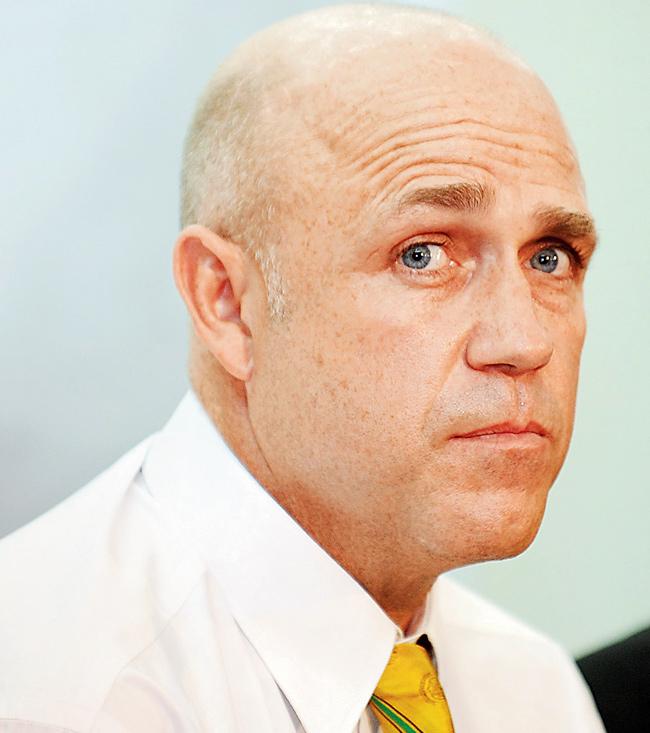Surely proper protocol dictated that such weighty decisions should be conveyed by the president himself, not by his subordinates. The BCCI doesn’t take such snubs lightly, writes Tony Cozier

WI cricket chief Dave Cameron (left) shares a light moment with Singapore's Imran Khwaja during an ICC meeting in London last year
The West Indies Cricket Board (WICB) announced prior to its emergency meeting in Barbados on Tuesday, dealing with the implications of the unprecedented abandonment of the tour of India, that it would be followed by a formal media conference.
WI cricket chief Dave Cameron (left) shares a light moment with Singapore's Imran Khwaja during an ICC meeting in London last year
ADVERTISEMENT
It didn't go through with it; it issued a release instead that listed the four decisions made. For all the critical role of Dwayne Bravo and his men in downing their bats and balls and heading home, the buck stopped with the WICB, the governing body of the sport in the region; this much the Board of Control for Cricket in India (BCCI) made clear in blaming it for its "inability to resolve internal issues with its players".
To put his case to the media was president Dave Cameron's opportunity to at least respond to the BCCI's sharp public censure and to the timeline it set out that led to the final decision. The couple of diligent reporters who managed to buttonhole him afterwards were told they were restricted to two questions.
"We deliberated on all the matters. We've come up with a few positions that we are going to take forward," was all they got – and a sheet of paper with the meeting's decisions. Either Cameron and his advisers believed it would serve no purpose to further aggravate their powerful, indignant hosts by responding to the inevitability of difficult questions or, more likely, he wasn't prepared to face them from the pack of relentless journalists.
The likely queries were obvious:
Would he like to comment on the BCCI's revelation that it had received his e-mail at 3.00 am (India time) on October 8, eleven hours before the scheduled start of the first ODI in Kochi, stating that he was withdrawing the team from the tour? Was he aware that, as the BCCI timeline put it, its secretary Sanjay Patel "rushed to Kochi and spoke to the players and managed to get on with the match"?
Richard Pybus
Did his position not dictate that he should have undertaken such a mission himself, as soon as he could get to India? As it was, neither he nor any of his directors appeared as the conflict became increasingly more impassioned. Could the president say if Patel did indeed ask him in Dubai on October 12 whether the rest of the tour would proceed, to which he replied that he would give an answer by close of the business day, October 15?
Astonishing
Why did it take an e-mailed reminder from the BCCI to prompt him to reply, at 3:00 am (India time) on October 17, that "the WICB are not able to provide any assurances or guarantees"? The correspondence said it would "communicate its position by the end of the day on October 17".
Most astonishing of all, why did the first e-mail to the BCCI cancelling the tour come at 10:00 am on October 17 from Richard Pybus, the director of cricket and an employee of the board, the reason for whose presence in India was obscure?
"WICB's position is that if the players refuse to play, then the players must return home and the rest of the ODI and Test tour is called off," the BCCI quoted Pybus as stating in his e-mail. "This has been discussed with the WICB president and CEO and they are fully aware of developments here".
According to the BCCI, confirmation came four hours later from the manager, Sir Richie Richardson. "On behalf of the entire squad and WICB, I apologise for the inconvenience caused," it ended. So did the tour.
Surely proper protocol dictated that such weighty decisions should be conveyed by the president himself, not by his subordinates. The BCCI clearly doesn't take such snubs lightly. There was also his reference to "terrorism", an emotive word in this day and age, in his early tweeted comment on the players' action.
Other points will certainly be raised by the Task Force appointed by the WICB to meet with "all parties" before reporting its findings to the directors. "Comprising critical stakeholders", it will be entirely independent. The inquisition will necessarily be more intense on Cameron and West Indies Players Association (WIPA) president Wavell Hinds whose disagreement with the players set off the altercation.
Those on the ground in India - team manager Richardson, chief selector Clive Lloyd, the highly respected captain of the unforgettable era of WI domination, and Bravo and his striking players will also relate their stories. The WICB conveyed optimism of the outcome in its release to the media.
"WICB believes that a way can be found to repair the damage that has been caused and to ensure that similar events do not recur, with the focus being on the betterment of West Indies and world cricket," it read. It's a tall order. To "ensure that similar events do not recur" would require a dramatic change in how the thinking of those who administer the game.
This was the fourth players' strike in the past 15 years; relations between the board and the players have always been fraught. Yet, several past reports recommending transformation have been ignored by those reluctant to surrender power; the latest crisis may just be the catalyst that forces them to.
Tony Cozier continues to be the voice of West Indies cricket
 Subscribe today by clicking the link and stay updated with the latest news!" Click here!
Subscribe today by clicking the link and stay updated with the latest news!" Click here!







